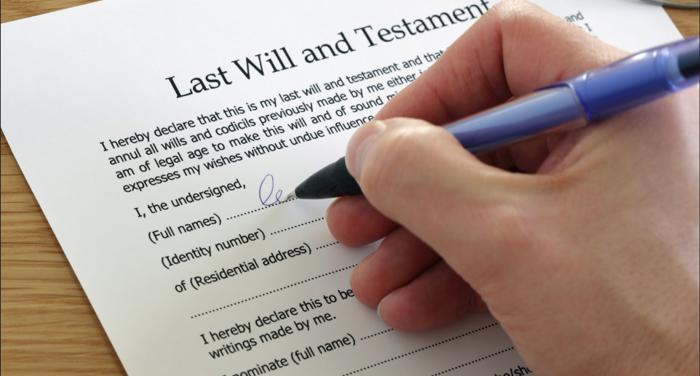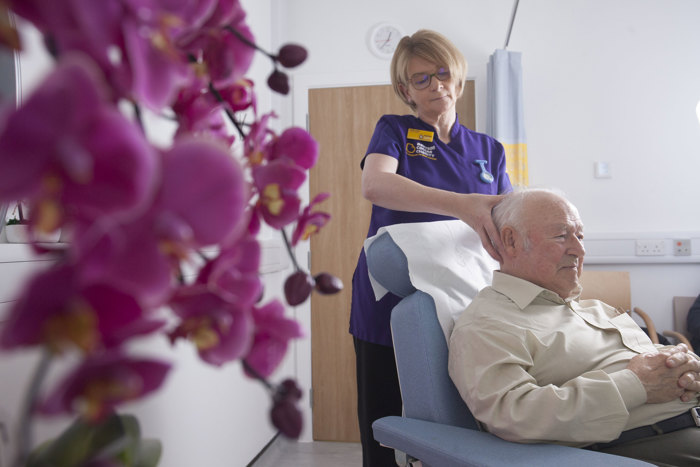Receiving a cancer diagnosis is difficult enough but when you are advised that your cancer is incurable or terminal and that you should prepare for end of life there are many things to consider for you and your family.

Planning ahead for the future at the time of a terminal diagnosis can undoubtably be overwhelming but it can give you more control over decisions about your future treatment and care, as well as help to ensure that your family and friends are aware of your wishes and allowing them to make the necessary arrangements when the time comes.
Some things to consider when making a plan for your future:
Reviewing or Making Your Will
Reviewing or making your Will means you decide what happens to your estate i.e. your money, property and possessions and the care of any dependents when you die.
Without a Will the law decides who inherits your estate and it will usually take longer and cost more to finalise.

Reviewing or Making a Will
Reviewing or making your Will means you decide what happens to your estate i.e. your money, property and possessions and the care of any dependents when you die. Without a Will the law decides who inherits your estate and it will usually take longer and cost more to finalise.
You can write your own Will, but it is advisable to get advice from a solicitor, independent financial adviser (IFA) or professional Will writer who can validate your Will. Some charities, including Beatson Cancer Charity offer a free will-writing service.
For more information on our Free Wills Service click here.
Appointing a Power of Attorney
A Power of Attorney is a legal arrangement that allows you to appoint someone to make decisions on your behalf, either because you don’t want to make your own decisions, known as an ordinary Power of Attorney, or if you lose the ability to make decisions for yourself due to lack of mental capacity in the future, known as a lasting Power of Attorney.
You must have the ability to make decisions for yourself (mental capacity) when you create your Power of Attorney. You can have more than one attorney and you can state the type of decisions you want them to make in terms of your healthcare, social care, where you live, your finances or property. It depends on what type of Power of Attorney you set up and what type of decisions you want them to make on your behalf.
In Scotland there are three main types of Power of Attorney as follows:
A Continuing Power of Attorney allows your attorney to make decisions about things such as paying bills, dealing with the bank or selling your house; a Welfare Power of Attorney allows your attorney to make decisions about things such as your treatment, medication, where you live or are cared for and a Combined Power of Attorney, as name would suggest, combines Continuing Power of Attorney and Welfare Power of Attorney.
You can get more information about Power of Attorneys from Gov.UK, NHS, The Office of the Public Guardian Scotland and organisations such as Age Scotland.
Understanding what benefits you may be entitled to
If you are terminally ill and been advised by a doctor that your life expectancy is less than 6 months, you may be entitled to some benefits under special rules. Even if you might live longer benefits under special rules usually apply for up to 3 years.
Employment and Support Allowance, Personal Independence Payment, Disability Living Allowance, Attendance Allowance and Universal Credit can be applied for under special rules, without the need for additional assessments. You will automatically receive the higher rate, except for the mobility component of PIP and DLA, which you will still need to apply for.
To make a claim contact the Department of Work and Pensions (DWP) and state you wish to claim the benefit under special rules. Your doctor or cancer nurse will also need to complete a DS1500 form and return to the DWP. You should receive payment within 2 weeks of sending the DS1500.
For more information on Benefits and how to apply contact the DWP
Planning Your Care
Planning your care in advance might help others understand what’s important to you, ensure that you get the type of care that you want and make things less stressful for you and your family. It is also helpful if there comes a time in the future when you’re unable to tell people what you want.

Advanced care planning
Advance care planning involves making decisions about your future care with your health and social care professionals. These wishes can be followed if you aren’t able to make decisions in the future. In Scotland, this is called anticipatory care planning.
Your doctors or nurses can help you understand your options and what sort of care you might need. It’s helpful to discuss your wishes with your family or friends.
Advance care planning can include anything about your future care including, where and how you wish to be cared for, your spiritual or religious needs or appointing a lasting Power of Attorney. It can also include an Advance Decision to Refuse Treatment or Advance Directive, sometimes referred to as a Living Will, where you make a decision regarding treatments that you would prefer not to have or in the event that your breathing stops you may instruct not to be resuscitated.
An Advance Decision to Refuse Treatment can only be made by someone aged 18 or over (16 in Scotland) who has the mental capacity to understand the decision they are making. It must state exactly what treatment you want to refuse and may also state when the refusal should apply. Refusing a particular treatment does not mean you will not receive good care or appropriate medication to help manage any symptoms you may have. An Advance Decision to Refuse Treatment can’t include a request to be given specific treatments or to have your life ended.
It’s your choice whether you make an advance care plan or not and you shouldn’t feel pressurised to do one or include anything that makes you feel uncomfortable.
Getting help coping with your feelings
Being given a terminal diagnosis can be overwhelming and be difficult to take in. Coping with the various emotions that such a diagnosis throws up ranging from shock to anger, sadness to fear, loneliness to anxiety can be difficult and distressing for you. Talking to someone, either your doctor or cancer nurse specialist, a family member, friend or counsellor can prove helpful.
There are several support organisations that provide counselling support including Marie Curie , Macmillan Cancer Support , Cancer Support Scotland and Maggies
Making decisions about your funeral
For some, planning your own funeral is important and for others it’s not. If it is important to you then it may be worth considering whether you wish to be buried or cremated, where your funeral should be held, whether it’s to be a religious ceremony or not, what music, poems or readings you would like, do you want flowers or donations given to a charity? It may help to write down your wishes and then tell your family and friends what you would like to happen. You could also put plans in place for your funeral by organising it yourself or arranging it through a funeral director.
Talking to loved ones about your plans
Talking to your family or friends about your plans can help them to know what’s important to you and make them aware of your expectations. This can be particularly important if you become ill unexpectedly or become unable to communicate your wishes in the future.
Some people find it difficult to acknowledge that they are going to die and don’t want to think or talk about these things at all but others find that making their future plans known brings a sense of relief or calmness, and it may give you more control over the care you receive in the future.
Collecting important documents and information
It can also be beneficial for you and your family to create a folder of important documents and information including your birth and marriage certificates, National Insurance Number, NHS number, passport, Will, Power of Attorney documents, bank and building society details, online and social media account information, benefits, pension and insurance policies, Advance Decision to Refuse Treatment and any funeral plans. It is also helpful to include details of your accountant and solicitor. Record where to find this information and ensure that your partner, family members or the executor of your will knows where this is kept.
Arranging who will look after your children or dependents
If there is no other surviving parent and your children are under 16, then you will have to make a decision about who will be responsible and care for your children once you have passed. It is advisable to discuss this with your children, if of suitable age, and also with the person you wish to look after your children to make sure they’re willing to accept this responsibility and then name them in your Will. You may also wish to consider setting up a trust fund or making other arrangements to provide for your children financially.
Making Memories
Many people find that when they’re told they are nearing the end of their life, there are things they want to do, or say or sort out. Whether it’s spending time with family and friends, repairing difficult relationships, making memories, doing things you enjoy while you still feel well enough, ticking off a few things on your “bucket list” or creating a lasting legacy, whatever it is, it’s important that you do what is right for you.

Leaving a legacy
If you feel up to it, you may wish to write letters, record audio, online or video messages, pull together a memory book or box with photos and messages for your loved ones. You may also wish to do something to benefit others like set up a trust or challenge fund to help support charities close to your heart once you have gone.
Although challenging it can also be quite cathartic, giving you the chance to reflect on things that you have achieved and are grateful for. They may help you focus on happier times and help you cope with feelings of anxiety.
Arranging life insurance
Taking out life insurance may be something to consider in order to help your dependants with things like mortgage repayments, bills, or school costs following your death. The price of life insurance can vary depending on the policy you choose. How much your dependents get also depends on the policy you have. You will need to make sure that payments are kept up to make sure you’re covered. The cost may be higher if you have an illness when you take out the policy.
Your employer may also have ‘death in service’ benefits that pays out money to a nominated person if you die.
Accessing Pension benefits
If your life expectancy is less than a year you may be able to take serious ill-health retirement which will enable you to take all of your pension pot as a tax-free lump sum if you are under 75 years of age, you are expected to live less than a year because of serious illness and you don’t have more than the lifetime allowance of £1,055,000 in pension savings. If you do take the entire sum this may mean there would be no benefits payable to your beneficiaries after you die. This depends on the rules of the pension scheme.
If you are over 75 years of age you will receive 25% of the pension pot tax-free and pay Income Tax on the remainder of the lump sum.
If you die before taking your pension any death benefits payable to your beneficiaries may be affected if you take serious ill-health retirement and if you die after taking your pension any unused money from your pension becomes part of your estate and may be subject to inheritance tax for your beneficiaries.
It is advisable to check with your pension administrator the best options for you and your beneficiaries.
More information on pensions and taking serious ill-health retirement can be found at:
Department of Work and Pensions
Macmillan Cancer Support
Other helpful information and resources can be found at:
NHS UK
MacMillan Cancer Support
Marie Curie
Maggies
Citizens Advice Scotland




 Donate
Donate